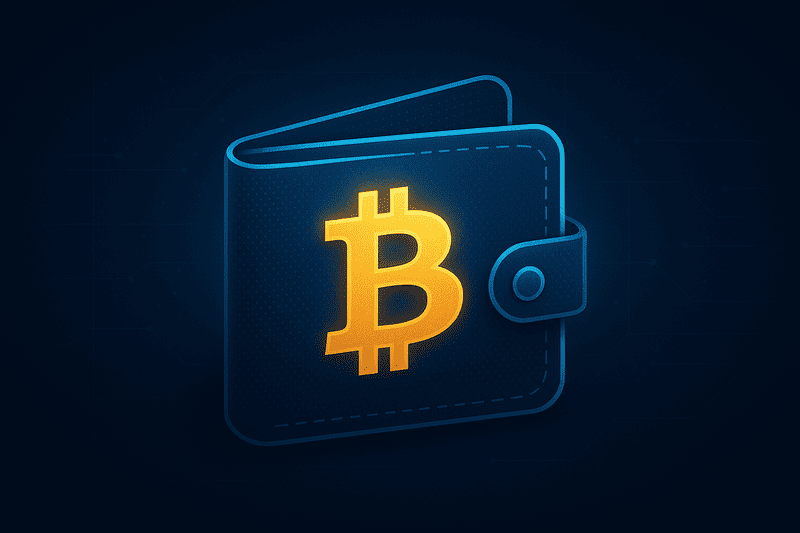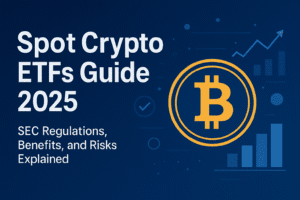Bitcoin is often called “digital money,” but it’s much more than that. Launched in 2009, Bitcoin is the world’s first cryptocurrency — money that exists only online, without banks or governments. Every transaction is secured by blockchain technology, making it transparent and tamper-proof.
In this beginner’s guide, you’ll learn exactly what Bitcoin is, how it works, why it’s valuable, and what it means for the future of money.
Table of Contents
What is Bitcoin?
Imagine you have a toy car. Normally, if you want to give that toy car to your friend, you just hand it over. Now your friend has the car, and you don’t. Easy, right?
Money usually doesn’t work like that. If you send money online through a bank or an app, a middleman (like the bank) keeps track of the transaction to make sure you’re not sending the same money twice.
Bitcoin changes this.
It’s a type of digital money that you can send directly to anyone, anywhere in the world — just like handing over that toy car — without needing a bank or company in between.
- It was created in 2009 by someone using the name Satoshi Nakamoto.
- Unlike paper money, no one government or company controls it.
- Only 21 million Bitcoins can ever exist, so it’s limited like gold.
People use Bitcoin for saving, investing, and sometimes even shopping. And the best part? Every transaction is recorded on something called the blockchain, which is like a digital notebook that everyone can see, but no one can erase.
For a deeper dive, you can check the official resource at Bitcoin.org.
History of Bitcoin (2008–2025)
Bitcoin didn’t appear overnight — it started with an idea in 2008.
2008 – Whitepaper Released
A person (or group) using the name Satoshi Nakamoto published the Bitcoin whitepaper: “Bitcoin: A Peer-to-Peer Electronic Cash System.”
It described a way to send money online without banks or middlemen.
2009 – Genesis Block
On January 3, 2009, the first Bitcoin block was mined — called the Genesis Block. This was the official birth of Bitcoin.
2010 – The First Real Transaction
In May 2010, a programmer named Laszlo Hanyecz paid 10,000 BTC for two pizzas. At that time, Bitcoin was worth less than a cent. At Bitcoin’s 2021 peak, those 10,000 BTC were worth over $600 million. Even in 2025, 10,000 BTC would still be valued in the hundreds of millions of dollars.
2011–2017 – Early Growth
Bitcoin slowly started gaining attention. New exchanges appeared, early adopters joined, and the price crossed $1, then $100, then $1,000.
2017 – First Major Bull Run
Bitcoin hit nearly $20,000 for the first time. This made headlines worldwide and introduced millions of people to crypto.
2021 – Institutional Adoption
- Bitcoin reached a new all-time high of around $69,000. Large companies like Tesla, MicroStrategy, and PayPal entered the space, and countries like El Salvador made Bitcoin legal tender.
2024 – Institutional Update
In 2024, U.S. regulators approved spot Bitcoin ETFs, increasing mainstream adoption.
As of 2025, more than 100 million people worldwide are estimated to own Bitcoin or other cryptocurrencies.
From a small experiment, Bitcoin has become the world’s most recognized and valuable cryptocurrency.
What is Bitcoin and How Does It Work?
To understand Bitcoin, imagine a huge notebook that everyone in the world can look at. This notebook records every single Bitcoin transaction — who sent it, who received it, and how much was moved. The magic is that this notebook is not kept in one place or by one bank. Instead, it’s shared across thousands of computers around the world.
This shared notebook is called the blockchain.
The Blockchain

- Every time someone sends Bitcoin, the details of that transaction are grouped with others into a “block.”
- Once the block is full, it’s locked and added to the chain of earlier blocks.
- This creates a permanent, unchangeable history of all transactions.
It’s like adding new pages to the notebook — and once a page is filled and added, it can never be erased or changed.
Miners and Security
You might wonder: Who makes sure nobody cheats?
That’s where miners come in.
- Miners are powerful computers that solve complex puzzles.
- When they solve the puzzle, they confirm transactions are valid.
- As a reward, miners earn newly created Bitcoin plus transaction fees.
This process keeps the system secure and makes sure no one can spend the same Bitcoin twice (a problem called “double-spending”).
Bitcoin Wallets

To use Bitcoin, you need a digital wallet.
- A wallet stores your private key (like a secret password).
- This key proves that you own your Bitcoins and allows you to send them.
- Without the private key, your Bitcoin is gone forever — so security is very important.
Decentralization
Unlike a bank, no single company or government controls Bitcoin.
- Transactions are verified by thousands of computers (nodes) worldwide.
- This makes the system resistant to fraud, censorship, or shutdown.
For an official deep dive, check out How Bitcoin Works on Bitcoin.org
What is Bitcoin Used For?
Digital Payments
- People use Bitcoin to send money anywhere in the world.
- No banks, no middlemen, just peer-to-peer transfer.
- Works 24/7, unlike traditional banking hours.
Store of Value
- Many call Bitcoin “digital gold.”
- It protects savings from inflation and currency devaluation.
- Limited supply (only 21 million coins) makes it scarce and valuable.
Investment
- Some buy Bitcoin hoping its price will rise in the long term.
- Popular strategy: Buy and hold (HODL).
- Also traded on exchanges for short-term profit.
Remittances
- Workers abroad can send money home cheaper than banks or Western Union.
- Faster and often with lower fees.
Online Purchases
- Some merchants, apps, and services accept Bitcoin as payment.
- Examples: Gift cards, VPN services, donations to charities.
Financial Freedom
- Bitcoin allows people in countries with unstable banking systems to still store and use money.
- Gives independence from government restrictions.
What is Bitcoin and Why Is It Valuable?
Limited Supply
- Only 21 million Bitcoins will ever exist.
- This scarcity makes it valuable, just like gold.
- No government or company can “print” more.
Decentralization
- No single person, bank, or government controls Bitcoin.
- Thousands of computers (nodes) around the world keep it running.
- This independence makes it resistant to censorship.
Security
- Every transaction is recorded on the blockchain.
- Miners and cryptography make it almost impossible to cheat the system.
- Bitcoin has never been hacked since launch in 2009.
Portability
- You can carry Bitcoin anywhere digitally.
- Transfer it across borders in minutes.
- Much easier than carrying gold or large sums of cash.
Divisibility
- One Bitcoin = 100 million satoshis (tiny units).
- You don’t need to buy a whole Bitcoin — even $5 worth can be owned.
- This makes it accessible to everyone.
Growing Adoption
- More people, companies, and even countries are using Bitcoin.
- The more it’s adopted, the stronger its network value becomes.
Pros and Cons of Bitcoin
Pros
- Decentralized: No government or bank controls it.
- Fast & Global: Send money anywhere in minutes.
- Scarcity: Only 21 million Bitcoins, like digital gold.
- Accessible: You can buy even $5 worth.
- Secure: Runs on blockchain technology.
Cons
- Volatile Price: Bitcoin price can rise or fall quickly.
- Irreversible Transactions: Once sent, you can’t get it back.
- Technical Learning Curve: Beginners need to learn wallets & security.
- Regulation: Rules differ in each country, sometimes unclear.
- Limited Acceptance: Not all shops or services accept Bitcoin.
Is Bitcoin Safe?
- Yes and No. The Bitcoin network itself is very secure — it has never been hacked since 2009.
- The risk comes from:
- Fake exchanges or scams
- Losing your private keys or passwords
- Keeping Bitcoin on unsafe platforms
- To stay safe:
- Use trusted exchanges (Coinbase, Binance, Kraken, etc.)
- Store Bitcoin in a secure wallet (preferably hardware wallet).
- Never share your private key.
So Bitcoin is safe as a technology, but your safety depends on how you use it.
Future of Bitcoin
Bitcoin has come a long way, but what about the future?
Growing Adoption
Millions of people already use Bitcoin, and adoption is expected to keep increasing. More businesses, apps, and even governments are exploring Bitcoin as money or an investment.
Institutional Interest
Large financial institutions like BlackRock and Fidelity are launching Bitcoin-related products such as ETFs. This brings Bitcoin closer to traditional finance and boosts trust.
Scaling Solutions (Lightning Network)
Right now, Bitcoin transactions can be slow or expensive during busy times. The Lightning Network is a new layer that makes transactions faster and cheaper — opening the door for micro-payments and everyday use.
Regulation
Governments around the world are working on rules for Bitcoin. Clearer regulations may help Bitcoin go mainstream, although strict rules could also limit its use in some countries.
Financial Freedom
For many, Bitcoin represents financial freedom — a way to escape traditional systems and even escape the 9–5.
Long-Term Value
With a fixed supply of 21 million coins, Bitcoin is expected to remain scarce and potentially grow in value over time. Many see it as “digital gold” — a hedge against inflation and unstable economies.
Whether it’s used as a global currency, a store of value, or simply as an investment, Bitcoin’s journey is still unfolding — and the next decade may be even more important than the first.
FAQs About Bitcoin
Q1. Do I need to buy a whole Bitcoin if I am just learning what is Bitcoin?
No. You can buy even a small fraction called “satoshis.” For example, ₹500 or $10 worth of Bitcoin is possible on most exchanges.
Q2. Is Bitcoin legal?
In most countries, Bitcoin is legal to own and trade, but rules vary. Some countries fully support it, while others restrict or ban its use. Always check your local laws before investing.
Q3. Can Bitcoin be hacked?
The Bitcoin network itself has never been hacked since 2009. However, exchanges and wallets can be hacked if you don’t secure them. That’s why hardware wallets and strong passwords are recommended.
Q4. How is Bitcoin different from other cryptocurrencies?
Bitcoin was the first cryptocurrency and remains the largest. Other coins (Ethereum, Litecoin, etc.) have extra features, but Bitcoin is the most trusted and valuable because of its scarcity and security.
Q5. Who controls Bitcoin?
No one person, company, or government controls it. Bitcoin runs on a decentralized network of thousands of computers around the world.
Q6. Is Bitcoin good for beginners?
Yes, but only if you start small, learn how wallets work, and practice safe storage. Many beginners use dollar-cost averaging (buying small amounts regularly) to avoid risks of timing the market.
Q7. What happens when all 21 million Bitcoins are mined?
Once all Bitcoins are mined (expected around the year 2140), no new coins will be created. Miners will continue earning rewards through transaction fees instead.
Conclusion
Bitcoin is more than just “internet money.” It’s a revolutionary system that allows people to send, store, and protect value without banks or middlemen. For beginners, the key is to understand its basics — blockchain, wallets, safety, and long-term value.
While Bitcoin can be volatile, it has proven itself as a secure and scarce digital asset since 2009. Whether you’re curious about investing, using it for payments, or just learning about the future of money, Bitcoin is worth exploring. Now you understand What is Bitcoin, how it works, and why it matters for beginners.
Remember: Start small, focus on security, and keep learning. Bitcoin isn’t just about price — it’s about freedom, innovation, and the possibility of building financial independence in a digital world.


![Read more about the article What Is Cryptocurrency and How Does It Work in India? [2025 Beginner’s Guide]](https://cryptomonkx.com/wp-content/uploads/2025/10/what-is-cryptocurrency-and-how-does-it-work-in-india-featured-image-300x200.png)

